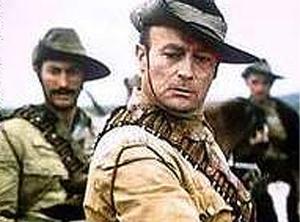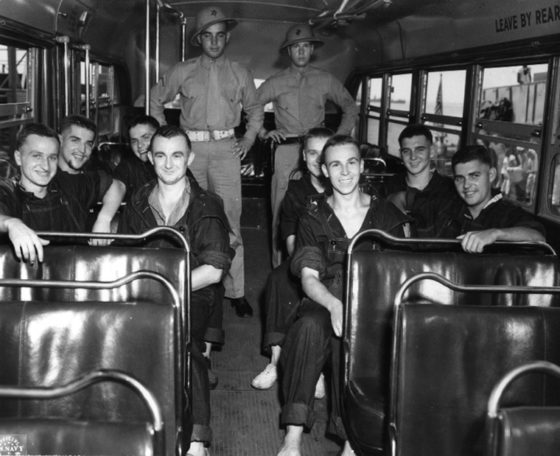
IS THE RIGID discipline and unquestioned obedience of the military a necessary evil in wartime or is it the breeding ground for the worst sorts of injustice? A number of memorable films about courts martial have tried to crack this very dilemma. Consider Rob Reiner’s 1992 classic A Few Good Men. But for seriously riveting courtroom drama, here are few older flicks you might have missed that we think do an even better job sorting out such weighty issues.
The Caine Mutiny
Set in the Pacific during the Second World War, The Caine Mutiny (1954) focuses on a war of nerves between the officers and newly appointed skipper of an American mine sweeper, the U.S.S. Caine. After realizing their new captain, Lt. Cmdr. Queeg (Humphrey Bogart), is showing signs of a madness, the officers of the vessel are forced to contemplate removing him from command. When Queeg finally goes to pieces in a crisis, his second in command has no choice but to take control of the vessel. Back in port, the unbalanced Queeg strikes back at his men, charging them with mutiny. Told through the eyes of a newly-minted ensign, the drama is sidetracked by a romantic sub-plot involving the junior officer and a mainland sweetheart. Yet overall the movie makes for good watching and includes a remarkable performance from Bogart as well as Fred MacMurray who really shines as the Caine’s wise-cracking (and self-serving) communications officer.
In Breaker Morant, three Boer War cavalry officers are scapegoated for following orders.
Breaker Morant
Nominated for an Academy Award, Breaker Morant is a 1980 Australian picture about the court martial of a trio Aussie cavalry officers in the Boer War. The three are railroaded by English generals for their part in the summary execution of a band of guerrillas who are caught after massacring some British troops. But things get sticky when it’s revealed that the Australians were merely following an unofficial directive not to take prisoners. The film capably explores more than just the bad blood that existed between colonial Australians and Great Britain, while raising some intriguing questions about morality in wartime. While the themes are timeless, the entire movie enjoys a newfound currency considering the similarities between a conflict like the Boer War and the current fighting in Afghanistan. Starring Edward Woodward as Morant and Bryan Brown, Breaker Morant will stay with you long after you’ve finished watching it.

Paths of Glory
The defendants in Stanly Kubrick’s Paths of Glory (1957) are also victimized by the military justice system. In this classic First World War courtroom drama, three French soldiers are chosen at random to pay with their lives for their regiment’s supposed failure to capture an impregnable German-occupied ridge. Rather than conceding that the abortive attack was hopeless from the start, one negligent French general shifts the blame for the entire fiasco onto his men. Kirk Douglas plays the officer tasked with representing the luckless trio of infantrymen who are selected to be shot as an example. Of course it’s mission impossible; the generals presiding over the trial want anything but justice. Aside from a sizzling script and brilliant performances, the film features one of the most difficult to watch five minutes in cinematic history.
Did we miss your favourite movie about military trials? Let us know your picks. Enter a comment below.











The Court Martial of Billy Mitchell (1955) and – a bit of a stretch but it is about military discipline – Mutiny on the Bounty (1962)
certainly the most striking film about a court martial, is Carrington VC.
Major Charles Carrington, played by David Niven, is court martialed for embezzling £125 from the regimental safe and entertaining a Female Capitain in his quarters, by his CO, who is jealous of his distinguished war service record.
Defending himself, he says uses the fact he had not been paid by regimental clerks and claimed the money taken was done openly as renumeration of his wages, since not being paid had caused his wife, played by Margaret Leighton, to become ill and suicidal.
After finding out that Carrington had a one night fling with the female captain, his wife lies in court saying that he had never mentioned taking the £125. Carrington produces a letter, that proves he had, but intends only to use the parts that are relvant to his defence, because the rest, which reveals his wifes illness, and the couples private affairs.
When the court insists he reveal the full letter, Carrington rips up the letter, preferring to maintain his wife’s dignity and save her embarrassment, than to reveal it to the court and walk free.
The court see through the lies, and sympathise with Carrington, although they find him guilty on all charges and dismiss him from the service.
Carrington decides not to appeal the verdict. His marriage is over, but he puts it down to the fact that Valerie is still in love with her late husband, killed during the war, and the father of her sons.
However, in the course of gossiping about the case, a telephonist at the telephone exchange admits overhearing Carrington’s phone call with his wife and what was really said. The telephonist’s testimony (if heard at the court-martial) would have provided evidence that Valerie was lying under oath.
Without Carrington knowing, as he exits the court-martial building, the other soldiers rally around and display their support for him. Moved, he decides to go along with the appeal; and there is the strong possibility that when the telephonist’s evidence is heard, the verdict will be quashed and Carrington acquitted.
Never seen it. Will check it out if I can find a copy over here.
Also recommend Rules of Engagement with Samuel L.Jackson on trial for alleged war crimes; with Tommy Lee Jones as his defense counsel. Very plausible story of how politics can influence military justice.
“The Court Martial of Jackie Robinson”…Famed baseball great, when he was a U.S. Cavalry Lieutenant, put his rank on the line in his 1944 court-martial after refusing to move to the back of a military bus by a racist civilian driver. He was considered as “uppity”, despite being called “Nigger” multiple times and demanding his rights as an officer. The film stars Andre Braugher, Daniel Stern, Ruby Dee, Stan Shaw, Paul Dooley and Bruce Dern. The film premiered on TNT on October 15, 1990